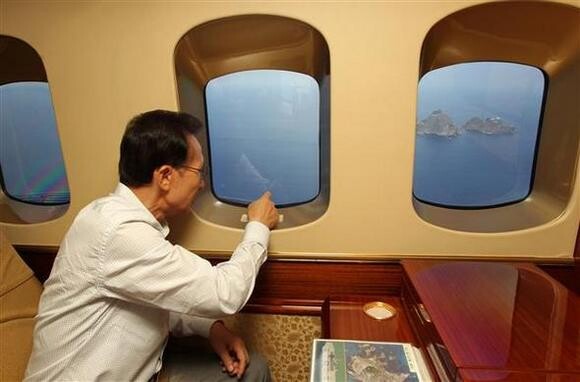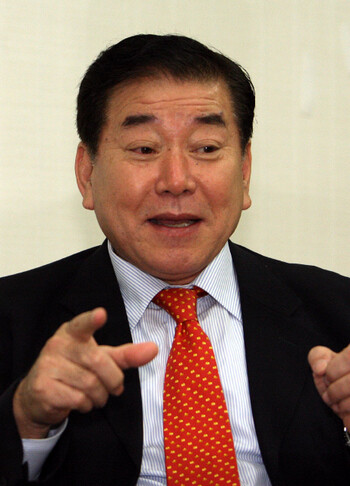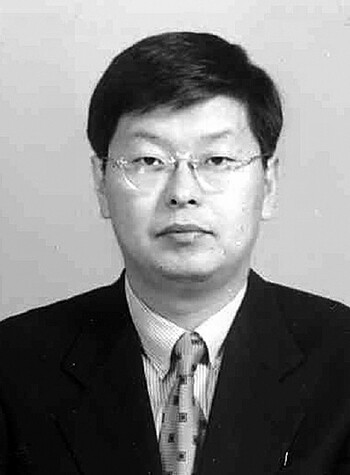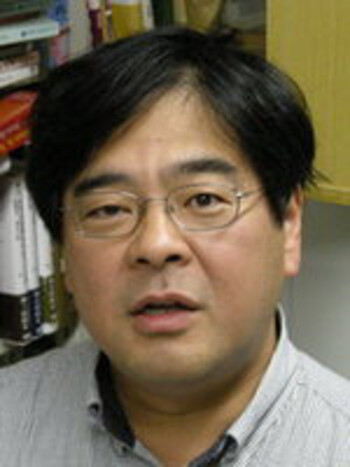hankyoreh
Links to other country sites 다른 나라 사이트 링크
The aftermath of President Lee’s sudden visit to Dokdo

By Kim Kyu-won and Son Won-je, staff reporters and Jeong Nam-ku, Tokyo correspondent
President Lee Myung-bak’s out-of-nowhere visit to Dokdo on August 10 is further complicating already tense relations with Japan. Experts are divided in their analysis on the reasons for the fly-by and how it might affect ties with Tokyo in the immediate future. The Hankyoreh spoke with three specialists on South Korea-Japan relations.

“A bit of shock treatment to drum up popular support”
- Moon Chung-in, Professor at Yonsei University
The first reason Lee Myung-bak carried out his Dokdo visit was to turn things around with his political situation at home. He and his associates don’t want to see this lame duck situation continue, so they came up with a bit of shock treatment to drum up popular support. In the past, the administration characterized its foreign policy as an “alliance of values,” but at the end of the day it went with the situation calculus.
Second of all, President Lee is the same person who tried to sign a military intelligence protection agreement with Japan in June. It may be that he was disappointed with Tokyo’s attitude. He pushed for that agreement and was looking at another one on logistics support, but Japan didn’t show good faith, as we saw when it claimed Dokdo in its latest defense white paper.
A surprise show like this is the last thing you want happening between two friendly countries. That’s why we always talk about and manage the major issues, keeping things predictable. This time around, President Lee broke with that basic foreign relations practice, and I imagine Tokyo was shocked by it. We’re a country that needs diplomacy with its neighbors, and this puts relations with Tokyo on an awkward footing. Right off the bat, the Democratic Party of Japan administration recalled its ambassador, and I think we’re going to see more than that from the Liberal Democratic Party going ahead. And we may find ourselves in a situation where our next presidents, including the one elected in December, will have to keep going to Dokdo. The military intelligence agreement with Japan is water under the bridge now, and this is only going to be a pain in the neck for Washington, which has been pushing for trilateral coordination.

“The president took out a sword when he needed a scalpel.”
- Jin Chang-soo, Director of the Sejong Institute’s Japan Center
I don’t think there are any South Koreans who would be personally against President Lee Myung-bak’s visit to Dokdo, but it’s problematic in terms of diplomatic strategy. To begin with, we don’t need to be pointlessly provoking Japan and stirring up anti-South Korea criticisms there. If something like this is necessary, then it should be done as part of an objectively mapped out sequence of responses. Instead, he brought out the big weapon way too early. Visiting is Dokdo is something of a trump card. The president took out a sword when he needed a scalpel.
The timing was also questionable. You have to ask if it was really necessary to create a big issue, one with major diplomatic repercussions, when he has just six months left in his term. What he did was to create an unsolvable dilemma and leave it for the next administration to sort out.
Japan is going to take things up a notch in the future. They’re going to look at most of the means they have at their disposal. They’re already looking at taking the case before the International Court of Justice (ICJ). Japan’s right-wingers are going to be asking themselves if there has ever been a better opportunity to turn Dokdo into a major issue.
It’s also important to manage relations with Tokyo moving forward, and that doesn’t look like it’s going to be easy for now. It could have an impact on issues like the comfort women and Korean labor conscriptees from the colonial era. Japan is going to find it difficult to maneuver with any kind of flexibility. So we’re looking at a bit of a freeze for the time being.

“Neither side has anything to gain from dragging this out into the long term”
-Kimiya Tadashi, Professor at the University of Tokyo
There’s been a lot more negative public opinion toward Japan in South Korea during the past year or so, due to things like the comfort women issue. President Lee had hoped Tokyo might help resolve things, but it didn’t. The impression I get from this visit is that he decided friendly relations with Japan weren’t all that important and he had nothing to lose from doing some Japan-bashing, so he played the card in the hopes of buoying his late-term approval ratings.
Meanwhile, Tokyo played the International Court of Justice card, knowing full well that South Korea wasn’t going to play along. What it’s trying to do is make it look to the international community that by refusing to accept an ICJ trial, Seoul is admitting its own claims aren’t legitimate. It doesn’t really have any better play than that at the moment.
It’s unfortunate that our shuttle diplomacy efforts have been shut down. Things may change depending on who is elected president this year, but with Park Geun-hye, the New Frontier Party candidate, saying she also plans to go to Dokdo, it looks like there’s still some potential for conflict. But neither South Korea nor Japan wants to let relations really fall apart. Yes, they’re feuding, at least superficially, but neither side has anything to gain from dragging this out into the long term. This is probably going to continue for some time, but eventually I think Seoul is going to look for a way to move past it.
Please direct questions or comments to [english@hani.co.kr]

Editorial・opinion
![[Column] Park Geun-hye déjà vu in Yoon Suk-yeol [Column] Park Geun-hye déjà vu in Yoon Suk-yeol](https://flexible.img.hani.co.kr/flexible/normal/500/300/imgdb/original/2024/0424/651713945113788.jpg) [Column] Park Geun-hye déjà vu in Yoon Suk-yeol
[Column] Park Geun-hye déjà vu in Yoon Suk-yeol![[Editorial] New weight of N. Korea’s nuclear threats makes dialogue all the more urgent [Editorial] New weight of N. Korea’s nuclear threats makes dialogue all the more urgent](https://flexible.img.hani.co.kr/flexible/normal/500/300/imgdb/original/2024/0424/7317139454662664.jpg) [Editorial] New weight of N. Korea’s nuclear threats makes dialogue all the more urgent
[Editorial] New weight of N. Korea’s nuclear threats makes dialogue all the more urgent- [Guest essay] The real reason Korea’s new right wants to dub Rhee a founding father
- [Column] ‘Choson’: Is it time we start referring to N. Korea in its own terms?
- [Editorial] Japan’s rewriting of history with Korea has gone too far
- [Column] The president’s questionable capacity for dialogue
- [Column] Are chaebol firms just pizza pies for families to divvy up as they please?
- [Column] Has Korea, too, crossed the Rubicon on China?
- [Correspondent’s column] In Japan’s alliance with US, echoes of its past alliances with UK
- [Editorial] Does Yoon think the Korean public is wrong?
Most viewed articles
- 1‘We must say no’: Seoul defense chief on Korean, USFK involvement in hypothetical Taiwan crisis
- 2N. Korean delegation’s trip to Iran shows how Pyongyang is leveraging ties with Moscow
- 3‘Weddingflation’ breaks the bank for Korean couples-to-be
- 4Will NewJeans end up collateral damage in internal feud at K-pop juggernaut Hybe?
- 546% of cases of violence against women in Korea perpetrated by intimate partner, study finds
- 6[Column] Park Geun-hye déjà vu in Yoon Suk-yeol
- 7“Parental care contracts” increasingly common in South Korea
- 8[Column] Yoon’s first 100 days should open our eyes to pitfalls of presidential system
- 9[Interview] Dear Korean men, It’s OK to admit you’re not always strong
- 10[Editorial] New weight of N. Korea’s nuclear threats makes dialogue all the more urgent